How Many People Had the Mogul Master Before It Came Out Again
By Major General Michael Reynolds
The commander of the U.S. Third Regular army, General George Patton, Jr., took no great pleasure in the end of the state of war in Europe; he already knew that despite his lobbying of many influential figures in Washington, D.C., he had no hope of existence reassigned to the Pacific Theater to command gainsay troops there. As he put information technology to his Iii Corps commander, Maj. Gen. James Van Fleet, "There is already a star [MacArthur] in that theater and you can only have one star in a prove."
Patton was too depressed because he knew there would exist a rapid reduction in the force of the U.S. Regular army in Europe, and he believed this was inviting disaster. On May 7, 1945, he had pleaded with visiting Undersecretary of War Robert Patterson: "Let'southward keep our boots polished, bayonets sharpened and nowadays a picture show of forcefulness and strength to these people [the Russians]. This is the only language they understand and respect. If y'all fail to exercise this, then I would similar to say to you that we have had a victory over the Germans and take disarmed them, but accept lost the war."

When Patterson told him that he did not sympathise the "big picture," but asked Patton what he would exercise near the Russians, he allegedly replied that he would keep the U.S. Army in Europe intact, delineate the border with the Soviets, and if they did not withdraw behind it, "push them back beyond it." He went on: "Nosotros did non come over here to acquire jurisdiction over either the people or their countries. We came to give them back the right to govern themselves. We must either end the job at present—while we are here and ready—or afterwards in less favorable circumstances." Needless to say, such ideas were totally unacceptable to the politicians in Washington—and indeed to most of the American soldiers in Europe; all they wanted to do was to become home.
Stories of General George Patton'due south encounters with the Russians are legendary, and some may well be apocryphal. On May thirteen, 1945, he reportedly entertained and decorated the commander of the Soviet Quaternary Guards Army at a luncheon in Linz, Austria. Patton noted in his diary that afterward a bout of heavy whiskey drinking during and later the repast, the Russian "went out cold," while he himself "walked out under my ain steam…. They are a scurvy race and but savages. Nosotros could crush hell out of them."
The following day he in turn was entertained by Marshal F.I. Tolbukhin, a Soviet Army Group commander, who tried to get him drunk and whom he described as "a very junior man who sweated profusely." He did admit that the Russian soldiers "put on a tremendous show … [they] passed in review with a very good imitation of the goose step…. The officers with few exceptions gave the appearance of recently civilized Mongolian bandits."
The most notorious incident allegedly happened toward the terminate of May when an English-speaking Russian brigadier general arrived at Patton's headquarters to demand that some river boats on the Danube that had contained Germans who had surrendered to the 3rd Army be returned to the Russians. Patton opened a drawer, pulled out a pistol, slammed it downwardly on his desk, and raged, "Goddamnit! Get this son-of-a-bitch out of hither! Who in hell allow him in? Don't allow any more than Russian bastards into this headquarters."
Afterwards the shaken Russian was escorted out, Patton is said to have exclaimed, "Sometimes you have to put on an act … That's the last we'll hear from those bastards." And apparently it was.

Iii days later VE-Day, Supreme Allied Commander General Dwight D. Eisenhower called a conference of all his U.S. Army commanders and told them that they were non to criticize publicly whatsoever of the campaigns that had won the state of war and of the demand for solidarity in the event that whatsoever of them were called before any congressional committees. Patton's version of what Ike said at this conference can exist read in his diary. He recorded that the supreme commander "made a speech which had to me the symptoms of political aspirations, on cooperation with the British, Russians and the Chinese, but especially with the British. It is my opinion that this talking cooperation is for the purpose of roofing up probable criticism of strategic blunders which he unquestionably committed during the campaign. Whether or non these were his own or due to besides much cooperation with the British I don't know. I am inclined to call up he over-cooperated."
On his render to Bavaria, Patton, equally military governor every bit well as 3rd Army commander, moved into his new headquarters, a erstwhile Waffen SS officers' training school at Bad Tölz, 30 miles south of Munich. Patton renamed the barracks Flintstone Kaserne, after Colonel Paddy Flint, an sometime friend and one of his regimental commanders who had been killed in Sicily. Patton's personal residence was a deluxe house on nearby Lake Tegernsee. Information technology had a swimming puddle, bowling aisle, and ii boats, and had once been owned past Max Amann, the publisher of Hitler'southward Mein Kampf. Information technology is as well of interest that Gestapo main Heinrich Himmler's wife had lived in another house on the lake, as had the wife of the infamous Waffen SS Kampfgruppe commander Jochen Peiper.
At the offset of June came the news that Patton had been dreading. He was to return to the States for a xxx-solar day bond sales bout. His plane, escorted by a formation of fighters and Boeing B-17 Flying Fortress bombers, touched down at an airfield near Boston on June vii, where an honor guard, a 17-gun salute, and the governor of Massachusetts greeted him. The American press had guaranteed him a hero'due south welcome. Rather surprisingly, Patton chose to return the governor's hat-doffing salute by removing his own helmet, complete with its four stars and the emblems of the 3rd and Seventh Armies and I Armored Corps. Then, with the formalities over, he was finally able to encompass his married woman Beatrice—it was their showtime hug in nearly three years. They were and so driven through the suburbs of Boston to a ticker tape reception in the metropolis itself.
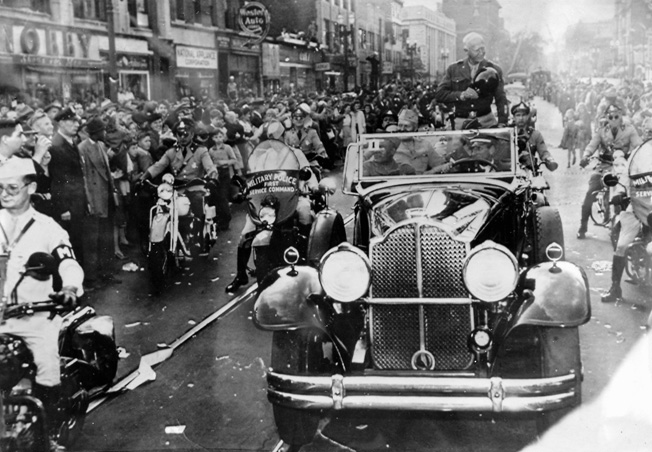
The oversupply along the 25-mile road was estimated at a million; people wept and girls threw flowers. And then, earlier a oversupply of upwards to l,000, he fabricated a speech in which he said, "My name is simply a hook to hang the honors on. This dandy ovation by Boston is not for Patton the full general, simply Patton as a symbol of the 3rd Army." The following twenty-four hour period, the Daily Record headlines announced: "FRENZIED HUB HAILS PATTON" and "GEN PATTON IN TEARS AT HUB TRIBUTE." This latter headline referred to Patton breaking down in tears during a spoken communication at a state dinner held in his honor that night; he was completely overcome by the glowing tributes.
Beatrice is said to have declared, "I tin hardly speak, I'thousand so overcome. This has been a proud and wonderful day." Simply, in fact, Patton had put his foot in it again. During his start speech that morn he had told his audience that the fact that a soldier was killed in action ofttimes made him a fool rather than a hero. What exactly he meant is unclear, only needless to say this remark enraged those who had lost relatives in the war and telegrams and letters soon began to flood into the State of war Section enervating an apology. They did not get information technology.
The twenty-four hour period afterward his render Patton and his wife flew to Denver and then on to Los Angeles and Pasadena. He made emotional speeches in all three places, with 100,000 people, including many Hollywood stars, turning out to hear him in the Los Angeles Coliseum. And so it went on throughout his leave—adulation from family unit, friends, and the vast majority of the public. To his superiors, though, General George Patton remained, as in the past, a potential embarrassment—a missile that might become off track at any moment —a missile that needed to be kept nether tight control. No doubt with this in heed Secretarial assistant of War Henry L. Stimson did simply that at a press conference in Washington on June 14; Patton was left merely to add a few comments well-nigh the Germans and the Third Army.
Fortunately, the official aim of Patton'due south month-long exit was achieved—his enthusiastic oratory helped to sell millions of war bonds and he received a letter of cheers from Treasury Secretary Henry Morgenthau. His personal ambitions, nonetheless, had not been achieved. His attempts to get an appointment in the Pacific had over again failed. His name had been included in a list of six generals submitted by the War Department for consideration by MacArthur, merely the Supreme Commander had rejected him out of hand.
"I'll Bet Y'all Goddam Buzzards are Just Post-obit Me to Meet if I'll Slap Another Soldier, Aren't You? Y'all're All Hoping I will!"
Along with the imitation pas committed during his Boston speech, Patton's past indiscretions continued to canis familiaris him. During a visit to Walter Reed Infirmary in Washington, he rounded on the press reporters post-obit him with the words, "I'll bet yous goddam buzzards are simply following me to see if I'll slap another soldier, aren't you? Y'all're all hoping I will!" His daughter, who worked in the amputee ward as an occupational therapist, recalled afterwards that when her begetter saw the soldiers there he flare-up into tears and exclaimed, "Goddammit, if I had been a better general, most of you would non be here." The men, who were not looking for sympathy, cheered him as he left.
Patton is said to accept predicted his own expiry to both his daughters, Ruth Ellen and Bee, during a visit to the latter'due south dwelling in Washington shortly earlier his return to Germany. He told them, while his wife was out of the room, that he believed his luck had run out.
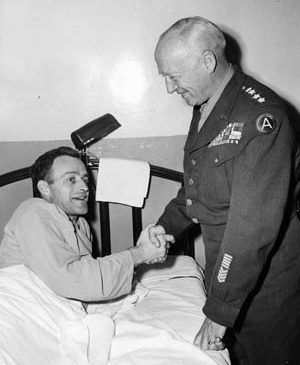
In early on July in Paris, Patton over again confided in his close friend Everett Hughes that he was glad to exist out of usa and back in Europe. This was despite the fact that an Army order banning dependents had prevented Beatrice from accompanying him. Patton's morale, however, got a lift when his aircraft was given a fighter escort for its flying to Bavaria and troops and tanks lined the route from the airfield to Bad Tölz. He wrote in his diary, "It gave me a very warm feeling in my heart to be dorsum among soldiers." Notwithstanding, Patton was pessimistic about the futurity of Europe, reluctant to get involved in the complexities of military machine government, and, perhaps more than importantly, reluctant to purge the Nazis.
In the case of Europe, he was convinced it would soon become Communist, and in the instance of the Nazis he saw practical bug. "My soldiers are fighting men and if I dismiss the sewer cleaners and the clerks my soldiers will accept to take over those jobs," he reasoned. "They'd have to run the telephone exchanges, the ability facilities, the street cars, and that's not what soldiers are for." In brusque, provided a German had the right qualifications for a particular job, Patton was prepared to ignore his former Nazi background. This was, of class, completely contrary to the political management he had received from Eisenhower for the denazification of the American zone of Germany. Furthermore, his bug were compounded by the fact that Washington was intent on demobilizing its warrior soldiers as quickly as possible, thus reducing his pool of skilled American manpower.
Past his very nature and background, Patton was unsuited to his office every bit military machine governor. He was not interested in the details of rebuilding a country. He had little patience with the thousands of displaced persons (DPs), whom he described every bit "too worthless to even cutting wood to go along themselves warm," and his growing anti-Semitism coupled with despair over the fate of Deutschland led him to the depths of melancholia. He wrote in his diary, "If we let Germany and the German people be completely disintegrated and starved, they volition certainly fall for Communism, and the fall of Germany for Communism will write the epitaph of democracy in the Usa. The more I see of people, the more than I regret I survived the war." He even accused the U.S. Treasury Secretary of "Semitic revenge against Germany."
On July 16, the Potsdam Conference convened, and Patton, resplendent with 20 stars and ivory-handled pistols, was in Berlin to see Truman preside over the raising of the American flag in the U.S. sector of the divided onetime German language capital. The two men did not get on. Truman wrote in his diary, "Don't see how a state tin can produce such men as Robert E. Lee, John J. Pershing, Eisenhower and Bradley and at the aforementioned time produce Custers, Pattons and MacArthurs."
Patton did not savor his time at that place and on the 21st wrote to Beatrice, "We have destroyed what could take been a proficient race and we [are] about to replace them with Mongolian savages. Now the horrors of peace, pacifism and unions will take unlimited sway. I wish I were young enough to fight in the adjacent one [war]. It would be real fun killing Mongols…. Information technology is hell to be old and passé and know it."
In his despondency, Patton reverted to the things he liked and did all-time—overseeing the training and discipline of his Army, riding, hunting, and reading‚—and for exercise he added a squash courtroom to his residence. But the end of the war with Japan just added to his depression morale; on August x he wrote in his diary, "Another war has ended and with it my usefulness to the world. It is for me personally another very sorry thought. Now all that is left is to sit around and expect the arrival of the undertaker and posthumous immortality."
Patton's biographer, Carlo D'Este, has suggested that his melancholy and increasingly boggling beliefs may accept been due to brain damage that resulted from a series of head injuries caused by a lifetime of falls from horses and road accidents—the well-nigh serious being an accident in Hawaii in 1936 that had resulted in a ii-twenty-four hours blackout. He goes on to say, all the same, that we shall never know, for afterwards his death Beatrice refused to allow an dissection on the body despite a request from the Army.
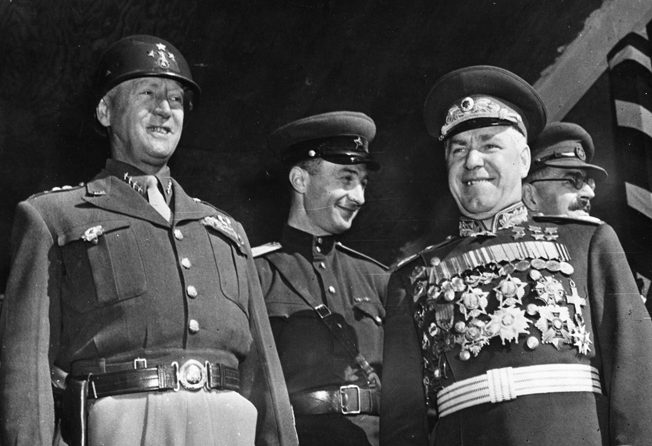
In September, Patton returned to Berlin for a military review hosted past the legendary Marshal Georgi Zhukov. He had lost none of his quick wit or audacity. When his host pointed out a new, massive, and very advanced Stalin IS-3 tank and mentioned that its cannon had a range of 17,000 meters, Patton is said to accept replied, "Indeed? Well, my beloved Align Zhukov, let me tell you this. If any of my gunners started firing at your people before they had closed to less than 700 yards, I'd have them court-martialed for cowardice."
Despite Patton's indiscretions and lack of interest in his overall duties, in August 1945 Bavaria was judged past Secretary of War Stimson to be the best-governed surface area in the whole U.South. European Theater of Operations (ETO), an opinion plain shared by his deputy. But whatsoever satisfaction Patton might have derived from this report was to be short-lived. In September things began to go terribly wrong for him.
During the early part of that month he decided to visit some of the prison camps in his area belongings hardened Nazis and former members of the Waffen SS. Army camp 24 at Auerbach, 100 miles northeast of Munich, held one-time members of the 1st Leibstandarte and 12th Hitlerjugend SS Panzer Divisions, and there had already been complaints past the senior German officer of "unbearable treatment of seriously disabled comrades."
These had, still, been rejected, and when references had been fabricated to the Geneva Convention, the officer had been told: "What do yous mean Geneva Convention? Y'all seem to accept forgotten that you lost the state of war!" Withal, Hubert Meyer, the ex-Chief of Staff of the Hitlerjugend, recalled that on the occasion of Patton'due south visit things had been very different. After satisfying himself about the definiteness of the complaints, Patton immediately ordered action to rectify the situation and then went further, ordering that the starvation diet, which was described by ane sometime senior German officer as "non enough to live on, just likewise much to die on," should be supplemented by American Regular army rations.
Information technology was in Camp 8 near Garmisch-Partenkirchen, 60 miles south of Munich, on September viii, 1945, that an incident occurred which was to accept severe implications for Patton's futurity career. After inspecting the American garrison responsible for administering and guarding the camp, he met the German commander of the prisoners. He complained that some Germans were being interned there equally political prisoners without justification. Patton is said to have told the American officers accompanying him that he thought information technology was "sheer madness to intern these people."
Not surprisingly, one of the American officers, a Jew, reported the incident to Eisenhower's headquarters, now housed in the IG Farben building in Frankfurt and known every bit Headquarters U.S. Forces European Theater (USFET). The complaint landed on the desk of Ike'due south civil affairs officeholder, Brig. Gen. Clarence Adcock. He briefed Ike's master of staff, General Walter Bedell Smith, who sent the report of the incident to Eisenhower who was on leave in the South of France. It was accompanied by a embrace letter of the alphabet saying Smith idea Patton was out of control in Bavaria and that Ike ought to come dorsum and take the matter in hand earlier whatsoever further harm was done.
Eisenhower returned and went to see Patton at Tegernsee on September 16. They talked until three in the morning, simply there is no record of whatsoever word almost Patton'south military governorship. They did, however, discuss Ike'due south successor. The former supreme commander was due to render abode in November to take over as Army principal of staff at the stop of the year. When Patton heard that Ike's likely successor was to exist his deputy, General Joseph McNarney, he said he had no wish to serve under a man who had never heard a gun go off. The only jobs in which he was interested were commandant of the Army War Higher or commanding full general of the Army army. Ike told him they were both already filled. Patton wrote in his diary, "I guess there is nada left for me only the undertaker."
General George Patton Meets Dorn on September 28: a "Smooth, Smart-Ass Academic Type."
Eisenhower returned to Bavaria a week later following reports of bad conditions in some of the DP camps there. The reports were truthful. Ike establish not only appalling weather only German guards, some of whom were former SS men. Patton tried to explain that the campsite had been fine before the arrival of the present Jewish occupants who were "pissing and crapping all over the place." Despite being told to "Shut up, George," he patently went on to say that there was an empty village nearby which he was planning to turn into a concentration camp for them. Eisenhower's response is unrecorded.
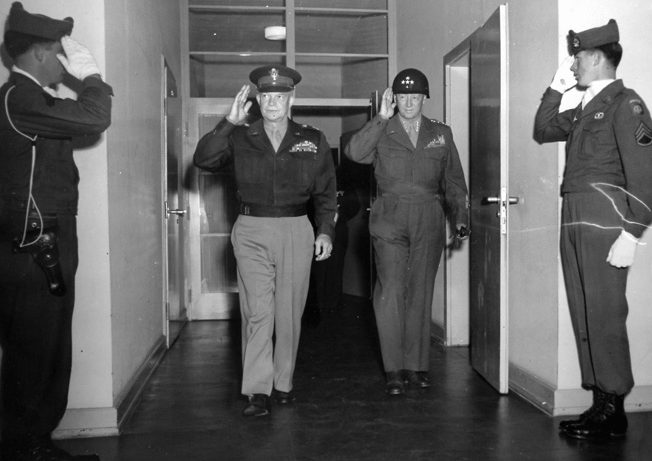
Past now Bedell Smith, Adcock, and others had come to the decision that Patton was mentally unbalanced. Adcock's civilian deputy, Walter Dorn, was a history professor on leave from Ohio State Academy. Of German origin, he was determined to rid Deutschland of all vestiges of Nazism. When Patton eventually met him on September 28, he described him equally a "smoothen, smart-ass academic blazon." Bookish or not, Dorn soon focused his attention on the success or otherwise of the denazification program in Bavaria. He discovered that the German organization set on behalf of Patton to administer Bavaria was riddled with former Nazis. Patton had taken so little involvement in the new administration that he did non even remember meeting its Minister President, a Dr. Fritz Schaeffer.
As a result of Dorn's discoveries and the PW Military camp 8 incident, he and Adcock, presumably with Bedell Smith's agreement, arranged for a psychiatrist, disguised as a supply officer, to be posted to Patton's headquarters to study his behavior—and, unbelievably, for Patton's phones to be tapped and his residence bugged. It is not clear if or what the psychiatrist reported, but needless to say it was not long earlier the wiretappers heard their bailiwick expressing violently anti-Russian views and fifty-fifty suggesting that ex-members of the Wehrmacht should be rearmed and used to assistance the U.South. Army forcefulness the Cherry Army "back into Russia." In one conversation with Ike's deputy, McNarney, he allegedly went as far as to say, "In ten days I can accept enough incidents happen to take us at war with those sons of bitches and brand it look like their error."
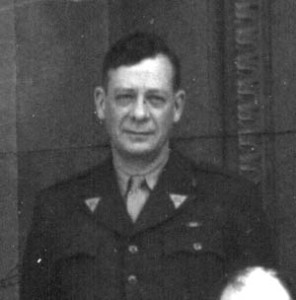
Patton held two disastrous press conferences during the following month. At the first, in Frankfurt on August 27, he "spoke out against the Russians and signed a letter proposing the release of some Nazi internees." This plainly so angered Eisenhower that he is said to take demanded that Patton acquit out the denazification programme as ordered "instead of mollycoddling the goddamn Nazis." But Patton was not going to modify; two days later he wrote in his diary, "The Germans are the only decent people left in Europe. If it's a choice between them and the Russians, I prefer the Germans."
Worse was to follow. On September 22, Patton agreed to reply questions from reporters subsequently his normal morning time briefing at Bad Tölz. When asked why Nazis were being retained in governmental positions in Bavaria, he replied, "I despise and abhor Nazis and Hitlerism as much every bit anyone. My record on that is clear and unchallengeable. It is to be establish on battlefields from Morocco to Bad Tölz…. At present, more than half the Germans were Nazis and we would be in a hell of a fix if nosotros removed all Nazi party members from office. The way I see it, this Nazi question is very much like a Democrat and Republican election fight. To get things done in Bavaria, after the consummate disorganization and disruption of four years of war, we had to compromise with the devil a lilliputian. We had no alternative but to turn to the people who knew what to do and how to do information technology. And then, for the time being we are compromising with the devil…. I don't like the Nazis whatever more than than yous do. I despise them. In the by 3 years I did my utmost to kill as many of them as possible. Now nosotros are using them for lack of anyone better until nosotros can get meliorate people."
Needless to say, the printing ran with this story, peculiarly the Democrat versus Republican analogy. When it became clear to Eisenhower that the press reports were basically accurate, he was balked and ordered Patton to written report to him in Frankfurt. The atmospheric condition was too bad to wing, and when Patton arrived on the 28th, after a seven-hr car journeying in heavy rain, he was uncharacteristically dressed in an ordinary khaki jacket and GI trousers. His normal cavalry breeches, swagger stick, and pistols had been left behind.
Patton knew he was in trouble. During their two-hour meeting Eisenhower was "more excited than I accept ever seen him," remembered Patton in his diary. At one stage the officer responsible for USFET Civil Diplomacy, Clarence Adcock, was summoned and he brought Professor Dorn into the room with him. The latter so skillfully and ruthlessly demonstrated that the Fritz Schaeffer administration in Bavaria was total of former Nazis.
When they were lonely again, Patton suggested that he should "be simply relieved," merely Ike said he did not intend to practice that and had had no pressure from the States to that event. "I and then said that I should be allowed to go on the command of the 3rd Army and the authorities of Bavaria," remembered Patton. But Eisenhower's heed was made up. Patton was offered control of the Fifteenth Army— an army in proper noun only since its sole mission was to set a history of the war in Europe! The simply culling was resignation.
He accepted the task with the Fifteenth Regular army, explaining this away in his diary by writing that in resigning "I would salve my self-respect at the expense of my reputation only … would become a martyr too shortly." He went on in his diary to justify his credence of the Fifteenth Army command as follows: "I was reluctant, in fact unwilling, to exist party to the destruction of Germany under the pretense of denazification…. I believe Deutschland should not exist destroyed, merely rather rebuilt as a buffer against the existent danger which is Bolshevism from Russia."
Eisenhower ended the meeting by telling Patton that he felt he should go back to Bad Tölz as rapidly as possible and that his personal train was ready to take him at 1900 hours. Patton's diary entry ended with the words, "I took the train."
The post-obit solar day Bedell Smith phoned Patton and read a letter of the alphabet to him from Eisenhower. It told him he was to presume his new appointment on October 8. When this was announced on the 2nd, many of the newspaper headlines, including that in Stars and Stripes, read "PATTON FIRED." Some papers were sympathetic; the New York Times wrote: "Patton has passed from current controversy into history. At that place he will take an honored place…. He was obviously in a postal service which he was unsuited past temperament, preparation or experience to fill. It was a error to suppose a free-swinging fighter could acquire overnight the capacities of a wise administrator. His removal by General Eisenhower was an acknowledgement of that mistake…. For all his showmanship he was a scientific soldier, a thorough war machine student…. He reaped no honor from the peace, but those he won in war will remain green for a long time."
Patton Did Not Wish to Get the "Executioner to the Best Race in Europe."
Patton'south letter to Beatrice, written the twenty-four hour period later his meeting with Ike, indicates the turmoil in his mind: "The noise against me is the but means by which Jews and Communists are attempting and with skillful success to implement a further dismemberment of Germany." He concluded it past proverb that he had no wish to be "executioner to the best race in Europe."
With regard to the fateful September 22 press conference, Patton later wrote: "This conference cost me the command of the 3rd Army, or rather, of a grouping of soldiers, mostly recruits, who so rejoiced in that historic proper noun, but I was intentionally directly, because I believed that it was and then time for people to know what was going on. My language was not especially politic, but I have even so to observe where politic linguistic communication produces successful authorities…. My principal involvement in establishing order in Germany was to prevent Federal republic of germany from going communistic. I am agape that our foolish and utterly stupid policy … volition certainly cause them to bring together the Russians and thereby ensure a communistic country throughout Western Europe. It is rather sorry for me to remember that my terminal opportunity for earning my pay has passed. At least, I take done my best equally God gave me the hazard."
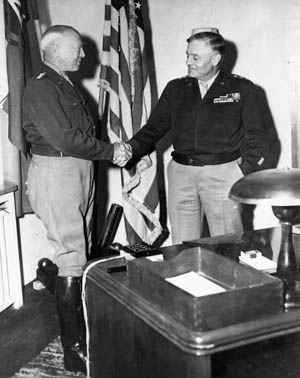
Patton handed over control of his beloved Tertiary Regular army to another cavalryman, General Lucian Truscott, on October 7, 1945. Information technology was a wet twenty-four hour period, and the ceremony was held, rather inappropriately, inside a gymnasium. Patton made a short farewell speech, which began with the words "All good things must come to an end" and ended with "Farewell and God anoint y'all." A ring and so played "Auld Lang Syne," the Third Army flag was handed over, and Patton left to the music of the 3rd Army march and "He'southward a Jolly Good Young man." Subsequently a luncheon in his honour, he left in the Third Army train for his new headquarters in Bad Nauheim, 20 miles north of Frankfurt.
I of Patton's last acts before handing over command was to accolade a Silverish Star to his driver of more than than four years, Main Sergeant John Mims. The award of a Argent Star to Mims, who was returning to u.s.a. for demobilization, is surprising in that this medal was meant to be awarded "for gallantry in action … non warranting the award of a Medal of Honor or Distinguished Service Cross." Clearly, as a general'south driver, even Patton's, Mims had never been in directly contact with the enemy and therefore could inappreciably accept been gallant in activity.
One could perhaps exist forgiven for suspecting that Patton saw this as an accolade to himself— the Argent Star was after all conspicuous past its absenteeism among his many decorations. This suspicion is reinforced past a annotate in a letter to Beatrice dated November 24: "I finally subsequently a fight of iii years got the DSM for all my people, ten in all. I retrieve it is agreeable that no one tries to become whatsoever [medals] for me. I got zero for Tunisia, nothing for Sicily and nothing for the Burl. Brad and Courtney [Hodges] were both decorated for their failures in this functioning."
Patton arrived at his new headquarters in the early hours of October eight. He was met by the officer temporarily holding the fort—Maj. Gen. Leven Allen, Bradley'due south former chief of staff. Patton's opening words were, "Well, you lot know damn well I didn't ask for this chore, don't you?"
The headquarters was in an old hotel in Bad Nauheim, and Patton'due south arrival in the mess for luncheon was greeted past some 100 officers standing to attention. In a highly successful attempt to break the ice, Patton's offset words were, "There are occasions when I can truthfully say that I am not as much of a son-of-a-bowwow every bit I may think I am. This is one of them."
Allen wrote after: "The relieved staff roared with surprised delight. From and so on information technology was as wholeheartedly for him as the Third Army staff had been." But Patton was not actually interested in an Regular army without weapons or a combat mission and consisting mainly of historians and an administrative staff. He announced that he intended to return to usa by March 1946 at the latest and that he expected all the necessary reports about the European campaign to exist finished by so. Withal, he took niggling serious involvement in the work other than to ensure, according to Eisenhower's son John, a lieutenant on the Fifteenth Army staff, that "Patton's Army was mentioned about three times as often as any other"—fifty-fifty though John Eisenhower himself "felt that the First Ground forces had contributed more to victory than had the Tertiary." Few unbiased military historians would disagree with that view.
So what did Patton practise with his time? He toured France collecting, according to his aide, enough certificates of honorary citizenship from cities similar Avranches, Rennes, and Chartres "to newspaper the walls of a room," and he had dejeuner with the unanimously elected president of the provisional French government, Charles De Gaulle, and dinner with the chief of staff of the French Army. Most of his fourth dimension, yet, was spent preparing his book War As I Knew Information technology. Part of Douglas Southall Freeman's introduction to War Equally I Knew Information technology, which was published in Nov 1947, reads: "He undertook this small book after the close of hostilities and he drew heavily from [his] diary for detail. Some pages of the narrative are well-nigh verbatim the text of the diary, with personal references toned downwardly or eliminated."
Although possibly mentally satisfying, such activities did little for Patton's morale and he soon became moody and tense. Full general Hobart "Hap" Gay, a loyal friend and his chief of staff, and other members of the staff noticed that he became withdrawn, often taking long drives by himself, having little to say during meals and going dwelling early. One staff officer wrote later: 'Information technology was obvious he was undergoing deep and gnawing turmoil."
One-time in October, Patton resolved to "quit outright, not retire…. For the years that are left to me I am determined to exist free to live as I want and say what I desire." This inevitably worried Gay, who surmised, well-nigh certainly correctly, that Patton planned to speak out confronting Eisenhower'southward handling of the campaign in Europe and against other senior officers, like Bedell Smith, Hodges, and even Bradley. Gay counseled Patton to consult Beatrice and other family members before taking such a drastic step, but information technology seems his mind was fabricated up.
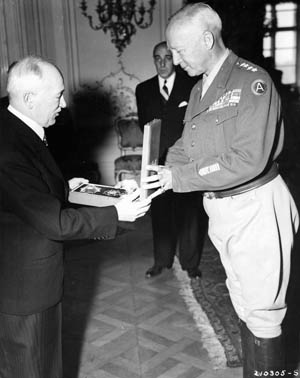
On November 11, Patton'southward 60th birthday, he was thrilled to find his staff had arranged a surprise party. It took the form of a gala evening in the ballroom of the Spa Hotel in Bad Nauheim, and Patton found himself again surrounded past friends and the heart of attending. And then, two weeks later on, he was again thrilled to receive an invitation to go to Sweden to address the Swedish-American Gild. Notwithstanding, the trip, which involved traveling on a special train once used by German President Paul von Hindenburg, turned out to be much more just a speaking date. Patton was greeted by the chief of staff of the Army and eight quondam members of the 1912 Olympic pentathlon team and was later received past the king and the crown prince. He besides breakfasted with Count Bernadotte and was able to enjoy a specially staged water ice carnival and hockey game in the Olympic stadium. The highlight was perhaps a reenactment of the 1912 Olympic pistol contest—Patton came second, "13 points improve than I made in 1912."
The Cadillac Accident: General Patton Becomes Unconscious, Bleeding Profusely From Caput Wounds
The Swedish trip was the terminal highlight of Patton's life. His last diary entry, dated Dec 3, describes a luncheon hosted past Bedell Smith for Eisenhower'southward successor, McNarney. His bitterness is very evident: "General Clay [Ike'southward deputy] … and General McNarney have never commanded annihilation, including their ain self-respect…. The whole tiffin party reminded me of a coming together of the Rotary Club in Hawaii where anybody slaps everyone else's back while looking for an appropriate place to thrust the knife. I admit I am guilty of this practise, although at the moment I take no appropriate weapon."
Two days later on, Patton wrote his last letter to his wife telling her that he was coming home for Christmas. "I have a calendar month's leave but don't intend to become back to Europe. If I get a really adept job I will stay, otherwise I will retire." The plan was to fly to London and then sheet from Southampton aboard the cruiser USS Augusta. The Augusta had been the flagship of the Western Job Force in the invasion of Morocco.
On the evening of December 8, Gay suggested to Patton that they should spend the following day pheasant shooting in an area known to be rich in game about 100 miles southwest of the headquarters. Patton accustomed with enthusiasm. He could think of no improve fashion to spend his terminal Sunday in Europe than hunting with an onetime and trusted friend.
Patton and Gay left Bad Nauheim at about 0900 hours on December ix in Patton's 1939 Model 75 Cadillac driven by Pfc. Horace Woodring. A jeep driven past Technical Sergeant Joe Spruce followed, carrying the guns and a gun canis familiaris. At about 1145 hours, in the northeast suburbs of Mannheim, an oncoming two-and-a-half-ton U.Due south. Army truck swung across the path of Patton's Cadillac in an endeavour to turn into a Quartermaster depot. Woodring was unable to stop in fourth dimension, and the two vehicles collided at a 90-degree bending, with the right forepart bumper of the truck peachy the radiator and bumper of the Cadillac.
Neither commuter was injured, and Gay received only slight bruises. Patton, on the other hand, although conscious, was bleeding profusely from caput wounds received when he was thrown forward confronting the steel frame of the drinking glass partition separating the front and rear seats and and then astern again into his seat. There were, of grade, no seat belts in those days, and whereas Gay and Woodring, having seen the oncoming truck, had braced themselves for the impact, Patton, who had been looking out the side window, had not. He knew he was seriously injured and evidently murmured, "I call up I'k paralyzed," and later on, "This is a helluva way to die."
The ambulance, which eventually arrived at the scene with two medical officers, took Patton to the 130th Station Hospital in Heidelberg, 15 miles abroad, where he was admitted at 1245 hours. He was paralyzed from the neck downwardly and suffering from severe traumatic shock; his pulse charge per unit was 45, and he had a claret pressure reading of 86/lx. With blood roofing his face and scalp from cuts that had gone through to the bone, he was diagnosed equally having "a fracture of the third cervical vertebra, with a posterior dislocation of the fourth cervical vertebra." Whether or not the spinal cord had been transected or simply traumatized remained a affair of conjecture.
Patton was put in a crude and extremely painful grade of traction that evening, and the U.S. Army Surgeon General in Washington recommended that a British neurosurgeon, Brigadier Hugh Cairns, and an orthopedic surgeon exist brought in to assist. A plane was sent to London to fetch them, and subsequently they arrived on the morning of the 10th, they advised some changes that turned out to be every bit painful. Fortunately, Patton'south condition began to stabilize. Subsequently nine days of agony, traction was maintained and the hurting eased by encasing Patton'due south cervix and shoulders in a special plaster jacket.
Beatrice and an American neurosurgeon, Colonel Geoffrey Spurling, flew in from the States on the 11th. Patton'southward medical records for that day read, "Prognosis for recovery increasingly grave." Spurling and the other doctors knew that it was impossible to operate to relieve the pressure on his badly damaged spinal cord to eliminate the paralysis. Patton, too, seems to have known that his injuries were irreversible, if not terminal. His outset words to his wife were, "I'm agape, Bea, this may be the concluding time we see each other."
Needless to say, rumors soon began to circulate that the blow that had led to Patton's death was no accident. Carlo D'Este dismisses this thought succinctly: "Those who advise that Patton was somehow murdered have failed to provide the slightest evidence of how anyone could have planned such a caper or ensured that Patton'south Cadillac would be momentarily stopped for the passage of a railroad train at the crossing simply down the street from the scene of the accident. Other than a handful of men on his personal staff, no 1 even knew where Patton would be, what road he would follow, or what time he would get in at his destination."
George Patton died peacefully at 1755 hours on December 21, 1945. The previous afternoon it had been necessary to give him oxygen to restore his breathing and X-rays revealed that a small pulmonary embolism had obstructed his upper right lung. Beatrice spent well-nigh of the final afternoon with him but left to take supper when he fell comatose at most 1715 hours. A doctor summoned her at about 1800 hours, but it was too tardily. Another embolism had struck his left lung.
Patton'south body, draped with his personal four-star flag, lay in state for two days in the Villa Reiner, a 19th-century mansion overlooking Heidelberg and the Neckar River. Beatrice initially wanted him flown dwelling for burying at West Point but was persuaded that this would be totally inappropriate since no American soldier had, upwards to that time, been sent home for burial.
She was then given a choice of three large U.S. military cemeteries in Europe and chose the one at Hamm, iii miles east of Luxembourg Metropolis. On the 22nd, the twenty-four hours Stars and Stripes carried the headline "PATTON DIES," she drove to Bad Nauheim to oversee her husband's effects existence prepared for shipment back to their home in Massachusetts. His beloved dog, Willie, was to follow later. Tributes were already offset to flow in and would eventually include messages from President Truman, British Prime Minister Clement Attlee, and the French National Assembly.
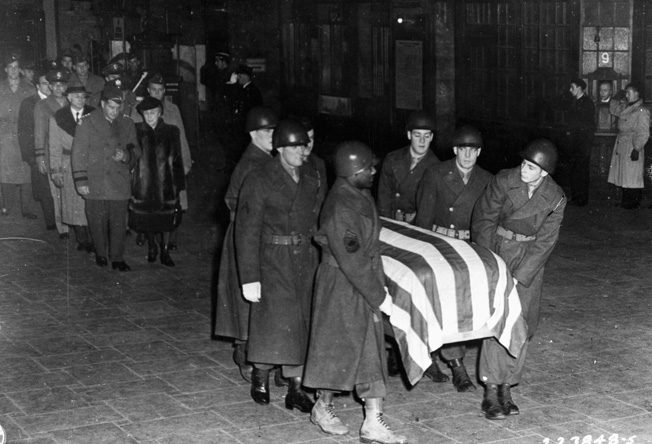
On the afternoon of the 23rd, Patton's coffin was taken on an Ground forces half-track to the Protestant Christ Church building in Heidelberg for a brusque Episcopalian service conducted past two Regular army chaplains during which there were no eulogies. Information technology was escorted by a platoon of the 15th Cavalry, the unit in which Patton had begun his career in 1910. Bedell Smith did non attend the service, which is inappreciably surprising since Patton carried his dislike for both him and Eisenhower to his grave. Only two months earlier he had told Ike, "I cannot swallow at the aforementioned table with Beetle Smith," and before he died he told Beatrice that he did not want either of them to attend his funeral. Patton could never forgive Ike for removing him from command of the Third Army.
Post-obit the service, the coffin, accompanied by Beatrice who was supported by Patton's erstwhile friend General Geoffrey Keyes, was taken to Heidelberg station along a route lined past some half-dozen,000 U.S. soldiers. At 1630 hours it began its journeying to Luxembourg where it arrived at 0400 hours on the 24th. The train stopped half dozen times during the journeying to allow award guards, bands, and mourners, despite the freezing weather and heavy pelting, to pay homage.
The route from Grand duchy of luxembourg City station to the U.S. cemetery was lined by troops from the United States, Belgium, France, and Luxembourg, and the cortège was followed by Prince Felix of Luxembourg, 2 French, one Italian, and numerous American generals, including Gay and Truscott.
George Southward. Patton, Jr., was buried at 0930 hours on December 24, 1945, among other American soldiers, many of whom had died while nether his command. The ceremony lasted 25 minutes. In the final minute of the ceremony, Principal Sergeant William Grand. Meeks, the man who had served Patton faithfully as his orderly since April 1942, presented Beatrice with the flag that had draped the coffin. There were tears in Meeks's eyes. A 12-human being squad raised its rifles, and a three-round volley of salutes echoed into the Luxembourg hills. The bugler played the soft, pitiful notes of "Taps."
Michael Reynolds was a retired major general in the British Army, a veteran of the Korean War and the old director of NATO'south Armed services Plans and Policy Division.
Source: https://warfarehistorynetwork.com/2018/06/11/real-story-general-george-patton-jr-death-final-days/
0 Response to "How Many People Had the Mogul Master Before It Came Out Again"
Post a Comment